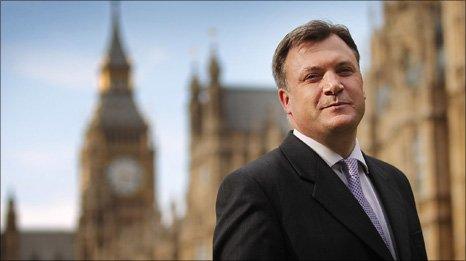Profile: Ed Balls
- Published

The biggest hurdle Ed Balls had to overcome in Labour's 2010 leadership election was establishing his own political identity, separate from that of Gordon Brown.
He owes his political career to Mr Brown, who talent-spotted him when he was a young financial journalist in the early 1990s.
By the time he was 30, he was effectively second in command at the Treasury, despite being an unelected official, helping to mastermind then chancellor Mr Brown's biggest policy coups such as the handing of the control of interest rates to the Bank of England and the five economic tests that kept Britain out of the euro.
He was also on the frontline of the war between Mr Brown's supporters and Tony Blair's Downing Street.
'Insurgency'
It was during this period that he gained a reputation - always dismissed as malicious gossip - for briefing against Labour colleagues seen as enemies of Mr Brown.
He has rejected Lord Mandelson's claim he was part of a Brownite "insurgency" against Mr Blair's premiership, arguing that there was a "creative tension" rather than warfare between the two camps.
But his combative, even abrasive, approach to politics has seen him labelled something of a bully in the past - something always denied by friends.
When Gordon Brown finally entered Number 10 in 2007, Mr Balls, who had become the MP for Morley and Outwood two years earlier, was handed the key role of education secretary, although there seemed little doubt that it would be merely a stepping stone to the much bigger prize of the chancellorship.
Policy battles
Sadly for him, it turned out not to be, but it was a role he continued to covet.
He did not see eye-to-eye with former chancellor Alistair Darling over the economy and sided with Gordon Brown in the party's policy battles in the run-up to the 2010 general election.
But, according to Lord Mandelson, a weakened Mr Brown felt unable to install Mr Balls, his closest political ally, at the Treasury.
No surprise, perhaps, that Mr Balls was the first of last summer's Labour leadership contenders to break ranks with the economic policy on which Labour fought the 2010 general election.
He has said Mr Darling was wrong to commit the party to halving Britain's record budget deficit in four years, telling BBC News that although he had toed the party line in government privately he "didn't think it could have been done".
'Team player'
When Labour lost power and Mr Brown was succeeded by Ed Miliband, Mr Balls was not his first choice for the shadow chancellorship.
Instead the new Labour leader surprised many by picking Alan Johnson - a well-liked and experienced politician but someone who lacked Mr Balls's economic credentials.
When he quit months later, citing personal reasons, Mr Balls got his chance in the role and has since headed up an aggressive line arguing against government cuts.
The son of a zoology professor, Ed Balls was educated at a private all-boys school, Nottingham High, and Oxford University, where he gained a first class honours degree, before attending Harvard, in the US, as a Kennedy scholar.
During the 2010 general election campaign he saw off a strong Conservative challenge in his own constituency by a whisker, later claiming, in a BBC interview, that this proved he was both a "winner" and a "team player".
It was by no means certain that Mr Balls would enter the race to succeed Mr Brown at the head of the Labour Party after the party lost power - not least because his wife, shadow home secretary Yvette Cooper, was considering her own leadership bid.
In the end Ms Cooper, with whom he has three children, and who represents a neighbouring constituency in West Yorkshire, decided not to stand.
Despite starting as an outsider, he mounted a disciplined and forceful leadership campaign, coming a creditable third behind the Miliband brothers.
He will inevitably be dogged by press speculation that he still hankers after the party leadership - but with the political spotlight so firmly on the economy he should have enough in his in-tray to keep him from making too much mischief for Ed Miliband - or so the Labour leader must hope.
- Published20 January 2011